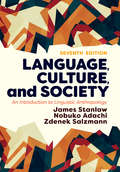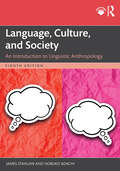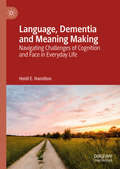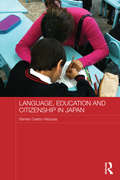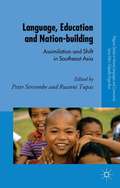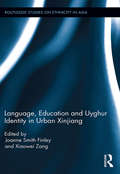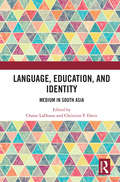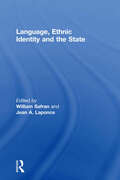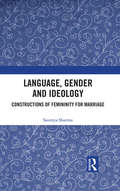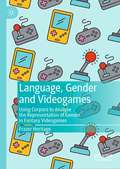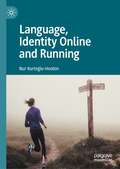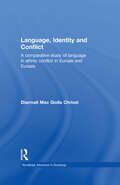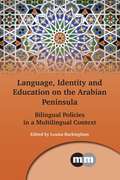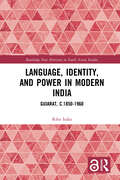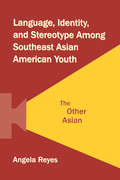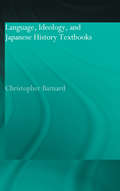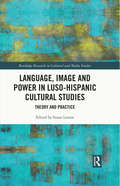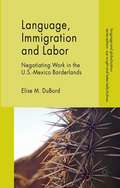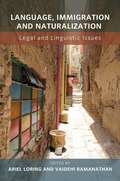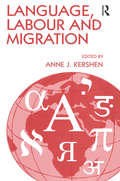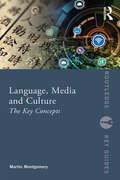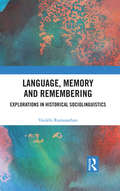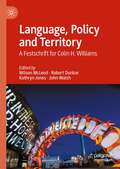- Table View
- List View
Language, Culture, and Society: An Introduction to Linguistic Anthropology
by James StanlawWhy should we study language? How do the ways inwhich we communicate define our identities? And how is this all changing in thedigital world? Since 1993, many have turned to Language, Culture, and Society for answers toquestions like those above because of its comprehensive coverage of allcritical aspects of linguistic anthropology. This seventh edition carries onthe legacy while addressing some of the newer pressing and exciting challengesof the 21st century, such as issues of language and power, languageideology, and linguistic diasporas. Chapters on gender, race, and class alsoexamine how language helps create-and is created by-identity.New to this edition are enhanced and updated pedagogical features, such aslearning objectives, updated resources for continued learning, and theinclusion of a glossary. There is also an expanded discussion of communicationonline and of social media outlets and how that universe is changing how weinteract. The discussion on race and ethnicity has also been expanded toinclude Latin- and Asian-American English vernacular.
Language, Culture, and Society: An Introduction to Linguistic Anthropology
by James Stanlaw Nobuko AdachiWhy should we study language? How do the ways in which we communicate define our identities? And how is this all changing in the digital world? Over seven editions, many have turned to Language, Culture, and Society for answers to questions like these because of its comprehensive coverage of all critical aspects of linguistic anthropology. This eighth edition carries on the legacy while addressing some of the newer, pressing, and exciting challenges of the twenty-first century, such as issues of language and power, language ideology, linguistic diasporas, as well as online and digital ecosystems. New to this edition are a reconceptualization of how linguistics approaches race, gender, and sexuality, with additional chapters and sections on how linguistics benefits archaeology and biological anthropology, as well as considerations of the relationship between language and truth, ethics, and war and politics. It also features enhanced and updated pedagogical features, such as learning objectives, updated resources for continued learning, and cross-references to updated encyclopedias of linguistic anthropology.
Language, Dementia and Meaning Making: Navigating Challenges of Cognition and Face in Everyday Life
by Heidi E. HamiltonThis book investigates the ways in which context shapes how cognitive challenges and strengths are navigated and how these actions impact the self-esteem of individuals with dementia and their conversational partners. The author examines both the language used and face maintenance in everyday social interaction through the lens of epistemic discourse analysis. In doing so, this work reveals how changes in cognition may impact the faces of these individuals, leading some to feel ashamed, anxious, or angry, others to feel patronized, infantilized, or overly dependent, and still others to feel threatened in both ways. It further examines how discursive choices made by healthy interactional partners can minimize or exacerbate these feelings. This path-breaking work will provide important insights for students and scholars of sociolinguistics, applied linguistics, medical anthropology, and health communication.
Language, Education and Citizenship in Japan (Japan Anthropology Workshop Series)
by Genaro Castro-VázquezBased on extensive original research, this book explores the early educational experiences of foreign children in Japan. It considers foreign children’s experiences of Japanese schools, examines the special tutoring such children often have to improve their language proficiency, and explores the role of mothers in encouraging their children’s education. It contrasts the experiences of foreign children with those of Japanese children and sets out the extensive difficulties foreign children encounter in becoming fully accepted by and integrated into Japanese society. The book concludes by discussing the nature of citizenship in Japan and the importance of education, including early education, in shaping Japanese citizenship.
Language, Education and Nation-building
by Peter Sercombe Ruanni TupasThis volume tracks the complex relationships between language, education and nation-building in Southeast Asia, focusing on how language policies have been used by states and governments as instruments of control, assimilation and empowerment. Leading scholars have contributed chapters each representing one of the countries in the region.
Language, Education and Uyghur Identity in Urban Xinjiang (Routledge Studies on Ethnicity in Asia)
by Xiaowei Zang Joanne Smith FinleyAs the regional lingua franca, the Uyghur language long underpinned Uyghur national identity in Xinjiang. However, since the ‘bilingual education’ policy was introduced in 2002, Chinese has been rapidly institutionalised as the sole medium of instruction in the region’s institutes of education. As a result, studies of the bilingual and indeed multi-lingual Uyghur urban youth have emerged as a major new research trend. This book explores the relationship between language, education and identity among the urban Uyghurs of contemporary Xinjiang. It considers ways in which Uyghur urban youth identities began to evolve in response to the state imposition of ‘bilingual education’. Starting by defining the notion of ethnic identity, the book explores the processes involved in the formation and development of personal and group identities, considers why ethnic boundaries are constructed between groups, and questions how ethnic identity is expressed in social, cultural and religious practice. Against this background, contributors adopt a special focus on the relationship between language use, education and ethnic identity development. As a study of ethnicity in China this book will be of huge interest to students and scholars of Chinese culture and society, Asian ethnicity, cultural anthropology, sociolinguistics and Asian education.
Language, Education, and Identity: Medium in South Asia
by Chaise LaDousa; Christina P. DavisThis book examines medium of instruction in education and studies its social, economic, and political significance in the lives of people living in South Asia. It provides insight into the meaning of medium and what makes it so important to identity, aspiration, and inequality. It questions the ideologized associations between education and social and spatial mobility and discusses the gender- and class-based marginalization that comes with vernacular-medium education. The volume also considers how policy measures, such as the Right to Education (RTE) Act in India, have failed to address the inequalities brought by medium in schools, and investigates questions on language access, inclusion, and rights. Drawing on extensive fieldwork and in-depth interviews, the book will be indispensable for students and scholars of anthropology, education studies, sociolinguistics, sociology, and South Asian studies. It will also appeal to those interested in language and education in South Asia, especially the role of language in the reproduction of inequality.
Language, Ethnic Identity and the State
by William Safran and Jean A. LaponceThis new study powerfully asserts the pivotal importance of the interplay between language and ethnicity, which is often underestimated as a component for political stability. These leading scholars present five key case studies of South Africa, Algeria, Canada, Latvia and Senegal. All five countries are multilingual nations where language has been a central political issue that has challenged their unity and stability.These studies are underpinned by two general, comparative and theoretical discussions, which analyse how scholars consider social class and economic factors to be the primary sources for political cohesion or of malcontent with the system and the new avenues opened by a focus on issues of langauge. This book will be of great interest to all students and scholars of linguistics, language, politics and sociology. This is a special issue of the leading journal Nationalism and Ethnic Politics.
Language, Gender and Ideology: Constructions of Femininity for Marriage
by Saumya SharmaThis book explores multiple facets of femininity for marriage in India. Using language as an entry point, it looks at how and why media representations of gender identities are constructed the way they are. It works with a unique synthesis of second-wave feminist discourse and empirical linguistic research to look at how the social institution of marriage becomes the site of interaction between language, ideology, psyche and culture. This volume also brings together the personal histories and views of women who discuss how media, modernity and social norms shape their ideas about marriage and selfhood. Deconstructing perceptions of femininity in contemporary India, the book will be of great interest to scholars and researchers of sociology, gender studies, linguistics, media and cultural studies and psychoanalysis.
Language, Gender and Videogames: Using Corpora to Analyse the Representation of Gender in Fantasy Videogames
by Frazer HeritageThis book explores how corpus linguistic techniques can be applied to close analysis of videogames as a text, particularly examining how language is used to construct representations of gender in fantasy videogames. The author demonstrates a wide array of techniques which can be used to both build corpora of videogames and to analyse them, revealing broad patterns of representation within the genre, while also zooming in to focus on diachronic changes in the representation of gender within a best-selling videogame series and a Massively Multiplayer Online Role Playing Game (MMORPG). The book examines gender as a social variable, making use of corpus linguistic methods to demonstrate how the language used to depict gender is complex but often repeated. This book combines fields including language and gender studies, new media studies, ludolinguistics, and corpus linguistics, and it will be of interest to scholars in these and related disciplines.
Language, Identity Online and Running
by Nur Kurtoğlu-HootonThis book focuses on language and identity online within the context of running from an interdisciplinary perspective. It brings together digital ethnography, existential phenomenology, interpretative phenomenological analysis and sporting embodiment in the pursuit to explore runners’ lived experiences and identities online. Language, identity and identity online are often studied in broader social contexts such as education, culture and politics, and running is intimately related to key issues in contemporary society, such as health and exercise, sport and nationalism, embracing a variety of discourse types and having implications more generally for our identity as human beings. The evolving online media through which people make sense of who they are and which groups they belong to are enabling new ways of realising identities and relationships. This book will be of interest to applied linguists, discourse analysts, as well as those interested in sports, sports psychology, and identity enactment.
Language, Identity and Conflict: A Comparative Study of Language in Ethnic Conflict in Europe and Eurasia (Routledge Advances in Sociology)
by Diarmait Mac Giolla ChríostThis innovative study of language and identity in recent and contemporary cases of ethnic conflict in Europe and Eurasia sets out a response to the limitations in the fields of linguistics and political science. Using examples of language policy and planning in conflict situations, it examines the functions of language as a marker of identity in ethnic conflict, and the extent to which language may be a causal factor in ethnic conflict.
Language, Identity and Education on the Arabian Peninsula: Bilingual Policies in a Multilingual Context
by Louisa BuckinghamThis collection examines the urban multilingual realities of inhabitants of the Arabian Peninsula in the early 21st century from the perspectives of learners, teachers and researchers. Focusing on both public and private spheres, it considers the importance of both English and immigrants' languages in a context of rapid socioeconomic development. Extending beyond English-Arabic societal bilingualism, the language practices of the Peninsula's citizens and residents serve multiple purposes in their daily lived realities. Chapters on home and heritage languages, identity, ELT, commercial signage and academic publishing contribute to a deepening understanding of the inherent linguistic diversity in these dynamic societies.
Language, Identity, and Power in Modern India: Gujarat, c.1850-1960 (Routledge New Horizons in South Asian Studies)
by Riho IsakaThis book is a historical study of modern Gujarat, India, addressing crucial questions of language, identity, and power. It examines the debates over language among the elite of this region during a period of extraordinary social and political change in the late nineteenth and early twentieth centuries. Language debates closely reflect power relations among different sections of society, such as those delineated by nation, ethnicity, region, religion, caste, class, and gender. They are intimately linked with the process by which individuals and groups of people try to define and project themselves in response to changing political, economic, and social environments. Based on rich historical sources, including official records, periodicals, literary texts, memoirs, and private papers, this book vividly shows the impact that colonialism, nationalism, and the process of nation-building had on the ideas of language among different groups, as well as how various ideas of language competed and negotiated with each other. Language, Identity, and Power in Modern India: Gujarat, c.1850-1960 will be of particular interest to students and scholars working on South Asian history and to those interested in issues of language, society, and politics in different parts of the modern world.
Language, Identity, and Power in Modern India: Gujarat, c.1850-1960 (Routledge New Horizons in South Asian Studies)
by Riho IsakaThis book is a historical study of modern Gujarat, India, addressing crucial questions of language, identity, and power.It examines the debates over language among the elite of this region during a period of significant social and political change in the late nineteenth and early twentieth centuries. Language debates closely reflect power relations among different sections of society, such as those delineated by nation, ethnicity, region, religion, caste, class, and gender. They are intimately linked with the process in which individuals and groups of people try to define and project themselves in response to changing political, economic, and social environments. Based on rich historical sources, including official records, periodicals, literary texts, memoirs, and private papers, this book vividly shows the impact that colonialism, nationalism, and the process of nation-building had on the ideas of language among different groups, as well as how various ideas of language competed and negotiated with each other.Language, Identity, and Power in Modern India: Gujarat, c.1850–1960 will be of particular interest to students and scholars working on South Asian history and to those interested in issues of language, society, and politics in different parts of the modern world.
Language, Identity, and Stereotype Among Southeast Asian American Youth: The Other Asian
by Angela ReyesThis book—an ethnographic and discourse analytic study of an after-school video-making project for 1.5- and second-generation Southeast Asian American teenagers—explores the relationships among stereotype, identity, and ethnicity that emerge in this informal educational setting. Working from a unique theoretical foundation that combines linguistic anthropology, Asian American studies, and education, and using rigorous linguistic anthropological tools to closely examine video- and audio- recorded interactions gathered during the video-making project (in which teen participants learned the skills for creating their own video and adult staff learned to respect and value the local knowledge of youth), the author builds a compelling link between micro-level uses of language and macro-level discourses of identity, race, ethnicity, and culture. In this study of the ways in which teens draw on and play with circulating stereotypes of the self and the other, Reyes uniquely illustrates how individuals can reappropriate stereotypes of their ethnic group as a resource to position themselves and others in interactionally meaningful ways, to accomplish new social actions, and to assign new meanings to stereotypes. This is an important book for academics and students in sociolinguistics, linguistic anthropology, discourse analysis, and applied linguistics with an interest in issues of youth, race, and ethnicity, and/or educational settings, and will also be of interest to readers in the fields of education, Asian American studies, social psychology, and sociology.
Language, Ideology and Japanese History Textbooks
by Christopher BarnardThe Japanese history textbook debate is one that keeps making the news, particularly with reference to claims that Japan has never 'apologised properly' for its actions between 1931 and 1945, and that it is one of the few liberal, democratic countries in which textbooks are controlled and authorised by the central government. There are frequent protests, both from within Japan and from overseas, that a biased, nationalistic history is taught in Japanese schools. This is the first time that all the authorised textbooks currently in use have been analysed using a critical discourse that is anchored firmly in the theory of 'language within society', elucidating the meanings and associated ideologies created by the language of the textbooks.
Language, Image and Power in Luso-Hispanic Cultural Studies: Theory and Practice (Routledge Research in Cultural and Media Studies)
by Susan LarsonThis volume explores the history, evolution, and future of Luso-Hispanic Cultural Studies as a discipline, a pedagogical tool, and a set of working practices by bringing together a diverse group of renowned specialists to examine how the field has grown out of and radically reconsidered some of the basic premises of British Cultural Studies since the 1950s to address the many cultures of the Spanish and Portuguese-speaking world. The chapters in this volume address How Cultural Studies is being practiced in the increasingly virtual mediascapes of the twenty-first century What happens to basic critical assumptions about culture and power after they have passed through the filter of Post-Colonial and Decolonial Studies of the Luso-Hispanic world How we understand the role of culture in light of recent experiences with radical demographic shifts, populism and civil unrest within Latin America, Iberian and the Latino U.S How new ways of practising Luso-Hispanic Cultural Studies have worked their way into our pedagogy and the structure of the curriculum in the age of the increasingly privatized neoliberal university Providing keen insight and reflection on these questions, this volume is an essential read for scholars and students of Visual and Film Studies, Latin American and Iberian Studies, Luso-Brazilian Studies, Language and Culture Pedagogy, Global Studies, and for anyone interested in Cultural Studies across the Luso-Hispanic world.
Language, Immigration and Labor
by Elise M. DubordThis book explores dominant ideologies about citizenship, nation, and language that frame the everyday lives of Spanish-speaking immigrant day laborers in Arizona. It examines the value of speaking English in this context and the dynamics of intercultural communication in fast-paced job negotiations.
Language, Immigration and Naturalization: Legal and Linguistic Issues
by Vaidehi Ramanathan Ariel LoringThis volume focuses on the everyday legalities and practicalities of naturalization including governmental processes, the language of citizenship tests and classes, the labelling and lived experiences of immigrants/outsiders and the media's interpretation of this process. The book brings together scholars from a wide range of specialities who accentuate language and raise issues that often remain unarticulated or masked in the media. The contributors highlight how governmental policies and practices affect native-born citizens and residents differently on the basis of legal status. Furthermore, the authors observe that many issues that are typically seen as affecting immigrants (such as language policies, nationalist identities and feelings of belonging) also impact first-generation native-born citizens who are seen as, or see themselves as, outsiders.
Language, Labour and Migration (Studies in Migration and Diaspora)
by Anne J. KershenLanguage, Labour and Migration explores two fundamental aspects of the migrant experience through a multi-disciplinary lens which combines the research of leading academics at the cutting edge of their fields. This latest volume from the centre for the Study of Migration brings together the work of anthropologists, economists, geographers, historians, political scientists and medical practitioners. Essays explore topics which include the role of mother tongue as a bridge to assimilation, the racialization of immigrants and refugees through language, the patterns of resistance undertaken by lascars, the experience of black British seamen in the eighteenth century, health advocacy in the twentieth century and the way in which cyber-space is being used to rediscover ethnic identity in the twenty-first century. Other essays examine Chinese labour in France during the First world war, employment opportunities for those deficient in the majority language and poverty in old age. All provide new and at times controversial, insights into the problems of language and labour in an alien society.
Language, Media and Culture: The Key Concepts (Routledge Key Guides)
by Martin MontgomeryLanguage, Media and Culture: The Key Concepts is an authoritative and indispensable guide to the essential terminology of the overlapping fields of Language, Media and Culture. Designed to give students and researchers ‘tools for thinking with’ in addressing major issues of communicative change in the 21st century, the book covers over 500 concepts as well as containing an extensive bibliography to aid further study. Subjects covered include: Authenticity Truthiness Structures of feeling Turn-taking Transitivity Validity claims With cross referencing and further reading provided throughout, this book provides an inclusive map of the discipline, and is an essential reference work for students in communication, media, journalism and cultural studies, as well as for students of language and linguistics.
Language, Memory and Remembering: Explorations in Historical Sociolinguistics
by Vaidehi RamanathanThis volume explores issues of memory, remembering and language in late colonial India. It is the first systematic historical sociolinguistic study of English private and public citizens who lived in and/or worked for India and the Indian cause from the 1920s to the 1940s. While some of the English have lived as common citizens and were committed to India, their voices and contributions have remained on the margins of Indian collective memory. This book offers microhistorical readings of extended language forms generally underexplored in sociolinguistics (such as letters, telegrams, missives, and oral histories) to reorient facets of individual memories, lives, and endeavours against larger officialised understandings of the past. Using previously unpublished corpus of archival material and interviews with English private citizens from that period, this volume on historical sociolinguistics will be of interest to scholars and researchers of language and linguistics, South Asian studies, post-colonial literary studies, culture studies, and modern history.
Language, Migration, and Identity
by Zane GoebelWhile much scholarship has been devoted to the interplay between language, identity and social relationships, we know less about how this plays out interactionally in diverse transient settings. Based on research in Indonesia, this book examines how talk plays an important role in mediating social relations in two urban spaces where linguistic and cultural diversity is the norm and where distinctions between newcomers and old timers changes regularly. How do people who do not share expectations about how they should behave build new expectations through participating in conversation? Starting from a view of language-society dynamics as enregisterment, Zane Goebel uses interactional sociolinguistics and the ethnography of communication to explore how language is used in this contact setting to build and present identities, expectations and social relations. It will be welcomed by researchers and students working in the fields of linguistic anthropology, sociolinguistics, the anthropology of migration and Asian studies.
Language, Policy and Territory: A Festschrift for Colin H. Williams
by John Walsh Kathryn Jones Wilson McLeod Robert DunbarThis volume celebrates the contribution of Professor Colin Williams, an immensely important and influential scholar in the field of language policy for more than forty years. Eighteen chapters by former students, colleagues and collaborators address a range of topics involving different aspects of language legislation and language rights, governance, economics, territoriality, land use planning, and onomastics. Six chapters address policy issues in Professor Williams’s native Wales while others focus on Canada, Catalonia, Ireland and Scotland. The volume concludes with an Afterword by Professor Williams himself. The book will be suitable for postgraduates and researchers not only in the field of language policy and planning but also sociolinguistics, geography, law and political science.
